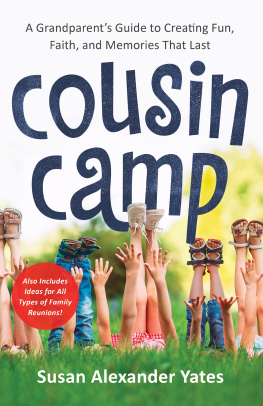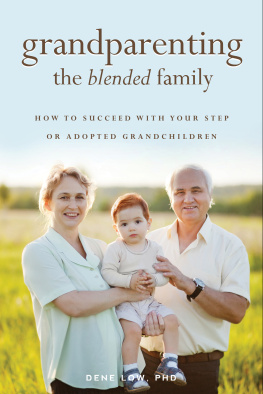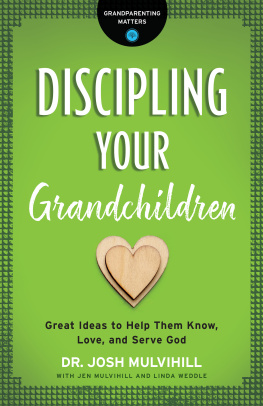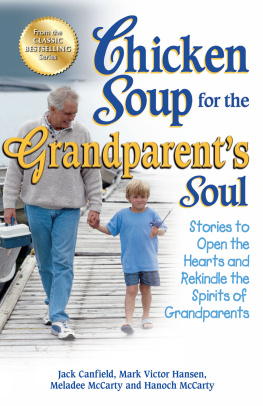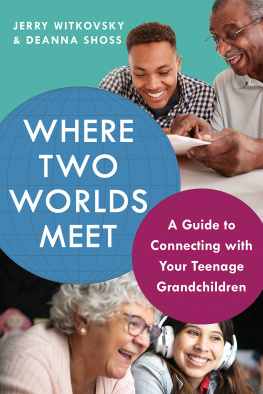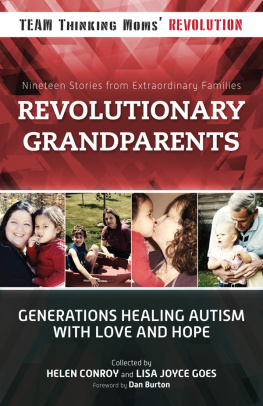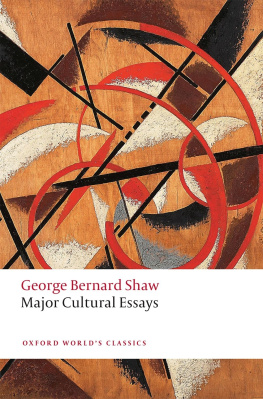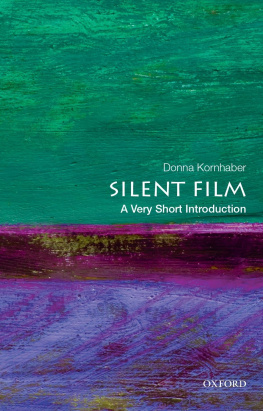Grandparents/Grandchildren
Grandparents/Grandchildren
The Vital Connection
Arthur Kornhaber, M.D.
and Kenneth L. Woodward
With a New Introduction by the Authors
First published 1985 by Transcation Publisher
Published 2019 by Routledge
2 Park Square, Milton Park, Abingdon, Oxon OX14 4RN
52 Vanderbilt Avenue, New York, NY 10017
Routledge is an imprint of the Taylor & Francis Group, an informa business
New material this edition copyright 1985 by Taylor & Francis.
Original edition copyright 1981 by Arthur Konnaper and Kenneth L. Woodward
All rights reserved. No part of this book may be reprinted or reproduced or utilised in any form or by any electronic, mechanical, or other means, now known or hereafter invented, including photocopying and recording, or in any information storage or retrieval system, without permission in writing from the publishers.
Notice:
Product or corporate names may be trademarks or registered trademarks, and are used only for identification and explanation without intent to infringe.
Library of Congress Catalog Number: 84-28034
Library of Congress Cataloging in Publication Data
Kornhaber, Arthur.
Grandparents / grandchildren.
Bibliography: p.
Includes index.
1. Grandparent and childUnited States. 2. GrandparentsUnited StatesInterviews. 3. Children United StatesInterviews. 4. Conflict of generations.
I. Woodward, Kenneth L. II. Title.
HO759.9.K671985306.8784-28034
ISBN 13: 978-0-87855-994-7 (pbk)
TO:
Chantal
David
Jeff
Kyle
Mila
Sabra
Todd
their Mothers
and their Grandparents
AND TO
Maryasha and Mordecai Vinocur, Great-Grandparents in loving memory
Acknowledgments
We wish it were possible to acknowledge the contributions of all those people who helped us in this work. It is truly the sum of the emotional and intellectual contributions of hundreds of people; those who worked as investigators, and those who shared their life experiences with us.
We thank the institutional administrators, teachers, caretakers, therapists, writers, scientists, and consultants, working in schools, offices, day-care centers, old folks homes, and social agencies who have assisted us in our investigation.
The format for the clinical investigation was designed and conceived by Arthur Kornhaber, M.D. Several people were instrumental in this process, supplying encouragement and inspiration. Among them are Mr. Shamus Culhane, Mrs. Ruby Houlihan, Eugene Kornhaber, M.D., Mr. Stuart Ostrow, and Mr. Eugene Wolkoff. Our colleagues were especially helpful in exchanging ideas and helping to refine the research questionnaire. Among them are Linda Seaver, A.T.R., John Stanley, A.C.S.W., and Susan Cook, A.C.S.W. Our research efforts were assisted by Kate Johnson, Chantal Kornhaber, and Evie Wissner. Emanuel Hammer, Ph.D. gave us helpful advice concerning the interpretation of the childrens drawings.
The clinical interviews were done by Arthur Kornhaber, M.D. and Carol Kornhaber. The latter participated in all phases of the investigation and helped to refine the questionnaire used in the study. She interviewed grandparents in place and made many new friends in the process. Her gift of compassion enabled children and grandparents to express themselves freely to her in a short period of time. The invaluable information that she helped us to obtain is the basis for our emotional history.
Most of all we thank the people who shared their life experiences with us, as grandchildren, parents and grandparents, and who taught us that whether or not we acknowledge it, we are all connected to a grandparent somewhere.
Introduction to the Transaction Edition
Arthur Kornhaber and Kenneth L. Woodward
Ten years ago, we began the first in-depth study of the relationship between grandparents and grandchildren. That study produced an extensive body of research; that research eventually turned into a book; that book led to the creation of a foundationthe Foundation for Grandparentingand all this helped fuel a national movement.
The goal of that movement is to create a truly intergenerational society. Put another way, the movement aims to reverse the current trend in America toward an age-divergent society, a society in which grandparents, parents, and grandchildren have become increasingly segregated and emotionally alienated from each other. In a divergent society, each generation suffers from the loss of those emotional bondswhat we call vital connectionswhich history and human experience tell us ought to bind them together. We are convinced that the old and the young have great need of each other, and that the burdens of being a parent are considerably reduced when children have regular and intimate contact with their grandparents. But the sad truth is that in most American families, relations between grandparents and grandchildren have become increasingly formal, strained, and devoid of emotional substance. Our ongoing research indicates that no more than 15 percent of American children enjoy regular and intimate contact with at least one grandparent.
The good news is that families can recover their natural, intergenerational ties. When we began our study, our aim was to analyze and describe the power of the grandparent-grandchild bond. We discovered that this bond is second in emotional power and influence only to the relationship between parents and children. Moreover, we discovered that no matter how grandparents act, they affect the emotional well-being of their grandchildren, for better or worse, simply because they exist. By listening to what grandchildren and grandparents revealed about their need for each other, we were able to draw up an agenda which families can use to assess their intergenerational ties and strengthen their vital connections.
Thousands of Americans who have read this book have discovered themselves in it. Grandparents, in particular, have recognized that something is missing in their livestheir own grandchildren. And many have resolved to do something about that loss. We know because in the past five years more than 10,000 people have written to us, pouring out their stories of severed relations with children and grandchildren. To cite one recent example: a woman from Texas wrote to tell us of her grandson, partially retarded, whose parents had placed him in a public institution for the mentally handicapped. This grandmother brings the boy to her home whenever possible, and each time the boy cries when he has to return to the institution: Grandma, why cant I live with you? he asks. The grandmother, still in her midfifties, has repeatedly offered to raise the child herself, but her daughter and son-in-law refuse permission. Theres bad blood between my daughter and me, the grandmother admits.
The Foundation for Grandparents (Mt. Kisco, New York) was created in part to help untangle such family problems. Organized in 1982, it now has hundreds of members in every state. One purpose of the foundation is to galvanize support for the Grandparents Rights Movement. As matters now stand, parents canfor whatever reasonsprevent their children from having any contact whatsoever with their childrens grandparents. But, as our research shows, the natural and inevitable emotional conflicts between parents and children often triggered by divorce need not and should not vitiate the unique emotional bond between grandparents and grandchildren. One of our most important psychological findings is that conflict between parents and children are not passed along to those parents grandchildren. In other words, no matter what kind of parents we are or were, all of us can be wonderful grandparents.





